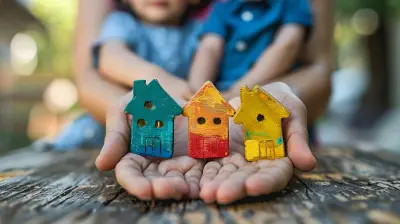Building Self-Esteem in Children Without Over-Praising
10 June 2025
Self-esteem plays a massive role in a child's emotional well-being, shaping how they see themselves and the world around them. While every parent wants to raise confident, resilient children, one common trap many fall into is over-praising.
We've all done it—cheering a child on for the smallest task, handing out endless "good jobs," or treating every scribble as if it belongs in an art museum. While praise feels like the right way to boost self-esteem, too much of it (or the wrong kind) can have unintended effects.
So, how do you foster real confidence and self-worth in your child without overdoing the praise? Let's break it down. 
Why Over-Praising Can Backfire
At first glance, praise seems like a great way to encourage kids. However, not all praise is created equal. Over-praising can have some surprising downsides:1. It Can Create Praise-Dependence
When kids are constantly told they’re amazing at everything, they may begin to rely on external validation rather than developing an inner sense of accomplishment. Instead of feeling good about their effort, they start seeking approval from others.2. It Can Make Kids Fear Failure
If a child is always told they are "so smart" or "the best," they may start to believe that their worth is tied to perfection. This can make them afraid to take on challenges where they might not immediately succeed.3. It Can Feel Insincere
Kids are smarter than we think. They can tell when praise is over-the-top or unwarranted. If everything they do gets a "Wow, amazing!" reaction, they may start tuning it out—or worse, doubting their abilities.4. It Can Reduce Motivation
Surprisingly, too much praise can actually make kids less motivated. If they're constantly told how talented they are, they may avoid working hard because they think they don’t need to. Or they may stop trying new things for fear of disappointing expectations.
How to Build Self-Esteem the Right Way
So, if over-praising isn’t the answer, what is? The key is helping children develop genuine confidence that comes from within, rather than from constant external validation. Here’s how:1. Encourage Effort, Not Just Results
Instead of overloading your child with generic praise, focus on recognizing their effort, progress, and problem-solving skills.For example:
❌ "Wow, you're so smart!"
✅ "I love how you kept trying even when that was tricky!"
This teaches kids that hard work and persistence matter, rather than just natural talent.
2. Let Them Struggle (A Little)
It's tempting to rush in and fix things when kids face difficulties. But letting them figure things out on their own (within reason) helps them develop problem-solving skills and resilience.Rather than jumping in immediately, try saying:
🗣️ "Hmm, that looks tough. What do you think could work?"
When kids overcome obstacles, they feel a deep, internal sense of accomplishment, and that’s where real confidence comes from.
3. Teach Growth Mindset
A growth mindset is the belief that intelligence and abilities can be developed through effort. Kids with this mindset are more likely to embrace challenges rather than avoid them.How can you encourage this?
- Use phrases like, "Mistakes help us learn!"
- Model learning from failures in your own life.
- Praise persistence: "You didn’t give up, and look how much better you got!"
When kids see struggles as a normal part of learning, they stop fearing failure and start embracing challenges.
4. Give Meaningful, Specific Praise
Instead of vague, over-the-top praise, be specific about what they did well.For example:
❌ "You're an amazing artist!"
✅ "I love the colors you used in your drawing—it looks so creative!"
This helps children understand exactly what they did well, so they can repeat the behavior in the future.
5. Encourage Independence and Decision-Making
Confident kids feel capable of handling life’s small challenges. Give your child opportunities to make decisions and solve problems independently.For example:
- Let them choose their outfits (even if they pick mismatched socks).
- Ask, "What do you think we should do?" when they face a problem.
- Let them help with real tasks, like cooking or setting the table.
Kids feel proud and capable when they realize they can do things on their own.
6. Model Self-Confidence
Children learn self-esteem from the adults around them. If they see you being self-critical or doubting yourself, they may adopt the same habits.Try to:
- Celebrate your own efforts: “I’m proud of how hard I worked today.”
- Speak kindly about yourself: “I made a mistake, but I’ll do better next time.”
- Show confidence in handling challenges: “This is tricky, but I can figure it out.”
When kids see you valuing effort and embracing mistakes, they’ll learn to do the same. 
Words Matter: What to Say Instead of Over-Praising
If you want to encourage confidence without overdoing praise, try these phrases:✅ "You must be so proud of yourself!" (Encourages internal validation)
✅ "That was tough, but you didn’t give up!" (Builds resilience)
✅ "I noticed you really took your time on this project." (Acknowledges effort)
✅ "What do you think about your work?" (Encourages self-reflection)
✅ "I love how you kept trying even when it was tricky." (Promotes perseverance)
These types of statements move the focus from pleasing others to feeling confident in their own abilities. 
The Long-Term Benefits of Healthy Self-Esteem
When kids develop genuine self-esteem, they:✔️ Are more willing to take on challenges
✔️ Handle criticism and setbacks better
✔️ Become independent and self-motivated
✔️ Feel good about themselves without needing constant validation
By shifting away from empty praise and towards meaningful encouragement, we help our kids grow into truly confident, resilient individuals.
And that’s something worth celebrating—not with a generic "Good job!" but with the knowledge that they can handle whatever life throws at them.
Final Thoughts
Raising confident kids isn’t about showering them with endless praise. It’s about showing them that their efforts, choices, and perseverance matter more than a gold star or applause.By focusing on effort over results, fostering independence, and encouraging a growth mindset, we give our kids the tools to believe in themselves—without needing validation from the outside world.
After all, true self-esteem doesn’t come from hearing "You're amazing!" all the time. It comes from knowing you’re capable, even when no one is watching.
all images in this post were generated using AI tools
Category:
Positive ParentingAuthor:

Zelda Gill
Discussion
rate this article
2 comments
Lara McKinley
Fostering self-esteem in children involves celebrating effort over success. Encourage problem-solving and resilience by offering constructive feedback and validating feelings. Engage in activities that promote independence and self-discovery, allowing them to learn from challenges without relying solely on praise.
June 16, 2025 at 2:59 PM

Zelda Gill
Thank you for your insightful comment! I completely agree that fostering self-esteem through effort, resilience, and constructive feedback is essential for children's growth and independence.
Pamela Cantu
This article offers valuable insights on fostering self-esteem in children through meaningful encouragement rather than over-praising. By focusing on effort and resilience, parents can help their kids develop a strong sense of self-worth. A balanced approach nurtures intrinsic motivation and prepares them for future challenges. Well done!
June 12, 2025 at 3:32 AM

Zelda Gill
Thank you for your thoughtful feedback! I'm glad you found the insights on fostering self-esteem through meaningful encouragement valuable. Your support means a lot!


